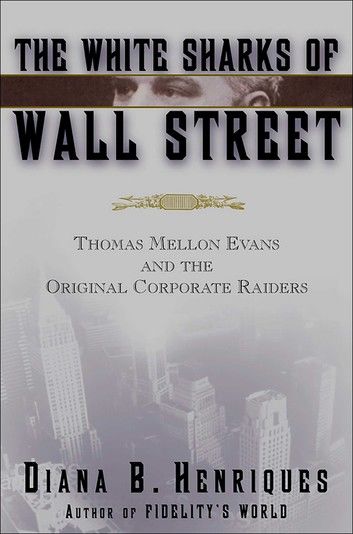| FindBook |
有 1 項符合
The White Sharks of Wall Street的圖書 |
 |
The White Sharks of Wall Street 作者:Diana B. Henriques 出版社:Simon & Schuster 出版日期:2001-04-02 語言:英文 |
| 圖書館借閱 |
| 國家圖書館 | 全國圖書書目資訊網 | 國立公共資訊圖書館 | 電子書服務平台 | MetaCat 跨館整合查詢 |
| 臺北市立圖書館 | 新北市立圖書館 | 基隆市公共圖書館 | 桃園市立圖書館 | 新竹縣公共圖書館 |
| 苗栗縣立圖書館 | 臺中市立圖書館 | 彰化縣公共圖書館 | 南投縣文化局 | 雲林縣公共圖書館 |
| 嘉義縣圖書館 | 臺南市立圖書館 | 高雄市立圖書館 | 屏東縣公共圖書館 | 宜蘭縣公共圖書館 |
| 花蓮縣文化局 | 臺東縣文化處 |
|
|
It almost seems that Thomas Mellon Evans was a man so far ahead of his contemporaries that he had moved into the shadows before the full force of his business style had dawned on the rest of corporate America. At every step in his career, he was barging in where few would follow -- at first. But follow they did, at last."
-- from the Prologue
The first in-depth portrait of the life and times of the trailblazing financier Thomas Mellon Evans -- the man who pursued wealth and power in the 1950s with a brash ruthlessness that forever changed the face of corporate America.
Long before Michael Milken was using junk bonds to finance corporate takeovers, Thomas Mellon Evans used debt, cash, and the tax code to obtain control of more than eighty American companies. Long before investors began to lobby for "shareholder's rights," Evans was demanding that public companies be run only for their shareholders -- not for their employees, their executives, or their surrounding communities. To some, Evans's merciless style presaged much that is wrong with corporate life today. To others, he intuitively knew what was needed to keep America competitive in the wake of a global war.
In The White Sharks of Wall Street, New York Times investigative reporter Diana Henriques provides the first biography of this pivotal figure in American business history. She also portrays the other pioneering corporate raiders of the postwar period, such as Robert Young and Louis Wolfson, and shows how these men learned from one another and advanced one another's takeover tactics. She relates in dramatic detail a number of important early takeover fights -- Wolfson's challenge to Montgomery Ward, Young's move on the New York Central Railroad, the fight for Follansbee Steel -- and shows how they foreshadowed the desperate battle waged by Tom Evans's son, Ned Evans, to keep the British raider Robert Maxwell away from his Macmillan publishing empire during the 1980s. Henriques also reaches beyond the business arena to tally the tragic personal cost of Evans's pursuit of success and to show how the family dynasty shattered when his sons were driven by his own stubbornness and pride to become his rivals. In the end, the battling patriarch faced his youngest son in a poignant battle for control at the Crane Company, the once-famous Chicago plumbing and valve company that Tom Evans had himself seized in a brilliant takeover coup twenty-five years earlier.
The White Sharks of Wall Street is a fascinating portrait of an extraordinary man, whose career blazed across the sky and then sank into obscurity -- but not before he had provided the template for how American business would operate for the next four decades.
|











